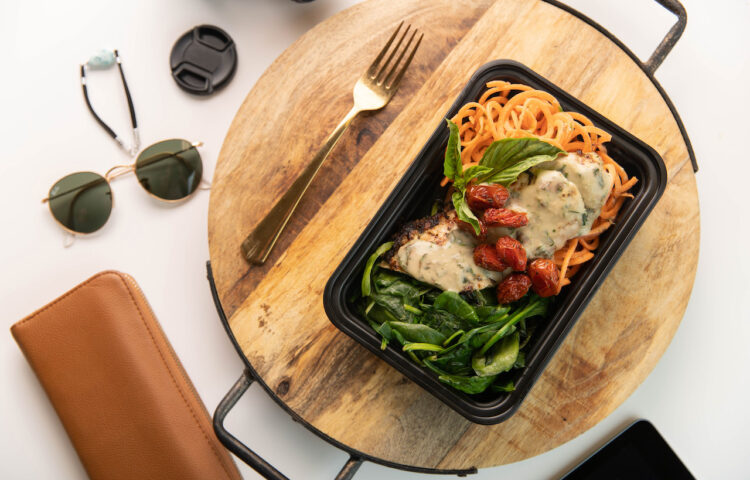Low calorie meal prep is an excellent way to lose weight and improve your overall health. By planning and preparing healthy meals in advance, you can avoid unhealthy food choices and make it easier to stick to your diet.
Catered Fit’s paleo meal plan is an excellent option for individuals who are looking to stay in shape and meet their fitness goals while following a low-calorie diet. The paleo meal plan is based on the concept of eating only whole, natural foods that were available to our hunter-gatherer ancestors, such as lean meats, fish, vegetables, fruits, nuts, and seeds. By eliminating processed and refined foods from the diet, the paleo meal plan can help you reduce your calorie intake and improve your overall health and wellbeing. Catered Fit’s paleo meals are carefully crafted to ensure that you get the right balance of macronutrients and calories to support your fitness goals, while still enjoying delicious and satisfying meals. With our convenient delivery options and easy-to-use ordering system, Catered Fit makes it easy to stick to your low-calorie diet and achieve your fitness goals with their paleo meal plan.
In this article, we will discuss the importance of low calorie meal prep and provide tips for planning and preparing healthy meals.
Why is Low Calorie Meal Prep Important?
Eating a low calorie diet is an effective way to lose weight and improve your overall health. When you consume fewer calories than your body burns, you create a calorie deficit that can lead to weight loss. Low calorie meal prep is important because it can help you stay within your daily calorie limit by providing healthy meals that are portioned and calorie-controlled. By planning and preparing your meals in advance, you can avoid unhealthy food choices and make it easier to stick to your diet.
Tips for Low Calorie Meal Prep
Here are some tips for planning and preparing healthy meals that are low in calories:
Plan Your Meals: Planning your meals in advance is crucial for low calorie meal prep. Take some time each week to plan out your meals and snacks. This will help ensure that you have all the necessary ingredients on hand and prevent you from reaching for unhealthy options when you’re short on time.
Focus on Whole Foods: When preparing low calorie meals, focus on whole, nutrient-dense foods such as lean proteins, complex carbohydrates, and healthy fats. Avoid processed foods, which are often high in calories, sugar, and unhealthy fats.
Measure Your Portions: Measuring your portions can help ensure that you are eating the appropriate amount of food for your calorie needs. Use measuring cups and a food scale to measure your portions accurately.
Use Healthy Cooking Methods: Choosing healthy cooking methods such as grilling, roasting, and baking can help reduce the amount of unhealthy fats in your meals.
Incorporate Vegetables: Vegetables are low in calories and high in nutrients, making them an excellent addition to any low calorie meal. Aim to include a variety of colorful vegetables in your meals.
Experiment with Flavor: Low calorie meals don’t have to be boring. Experiment with herbs, spices, and different cooking techniques to add flavor to your meals without adding extra calories.
Don’t Forget about Snacks: Healthy snacks can help keep you full and prevent overeating. Choose snacks that are low in calories and high in protein and fiber.
Prepare in Bulk: Preparing meals in bulk can save time and make low calorie meal prep more convenient. Cook large batches of food and store them in portioned containers in the fridge or freezer.
Keep it Simple: Low calorie meal prep doesn’t have to be complicated. Simple meals such as grilled chicken with roasted vegetables or a salad with grilled shrimp can be delicious and low in calories.
Stay Hydrated: Drinking plenty of water throughout the day can help keep you hydrated and prevent overeating. Aim to drink at least eight glasses of water per day.
Conclusion
Low calorie meal prep is an excellent way to lose weight and improve your overall health. By planning and preparing healthy meals in advance, you can avoid unhealthy food choices and make it easier to stick to your diet. When planning your meals, focus on whole, nutrient-dense foods such as lean proteins, complex carbohydrates, and healthy fats. Measure your portions, incorporate vegetables, experiment with flavor, prepare in bulk, keep it simple, and stay hydrated to make low calorie meal prep more manageable and enjoyable. By making small changes to your diet and lifestyle, you can achieve your weight loss goals and improve your overall health.

